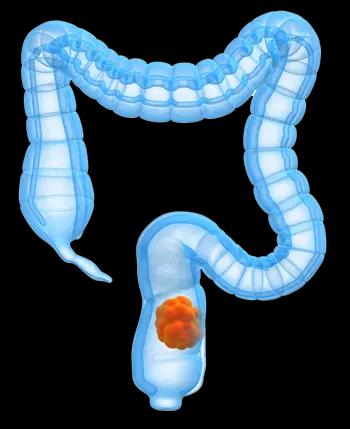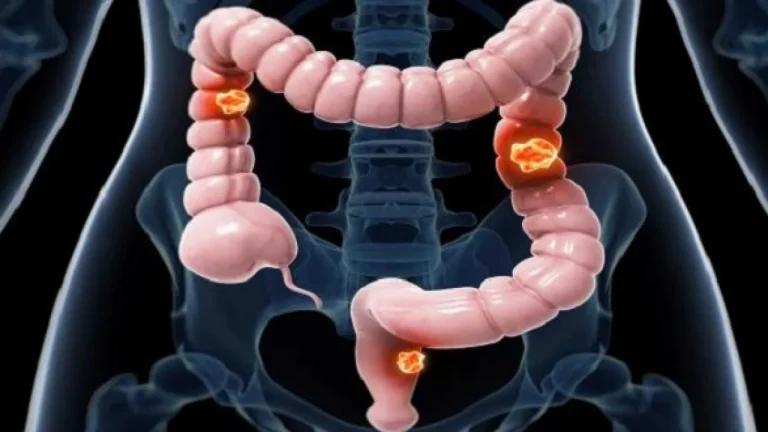Colorectal cancer, also known as colon cancer is a prevalent health concern affecting millions worldwide and presents distinct challenges in its various stages. Among these, stage II colon cancer holds a unique position, marked by the cancer’s progression beyond the inner lining of the colon or rectum. This article looks into the details of stage 2 colorectal cancer, exploring its characteristics, diagnostic procedures, treatment options, and the overall prognosis for individuals facing this complex condition.
Understanding stage 2 colorectal cancer
Stage 2 colorectal cancer is a significant milestone in the progression of this disease. At this stage, the malignant cells have broken through the outer layers of the colon or rectum, but have not yet spread to the nearby lymph nodes or distant organs. This stage is further divided into three sub-stages, each with distinct features and treatment implications.
Stage 2A colorectal cancer
In stage 2A colorectal cancer, the tumour has grown through the outer lining of the bowel, known as the muscularis mucosa. This indicates that the cancer has advanced beyond the innermost layer of the colon or rectum, but has not yet invaded nearby tissues or organs.
Stage 2B colorectal cancer
Stage 2B colorectal cancer is characterised by the tumour’s growth through the outer lining of the bowel and into the tissue layer, or peritoneum, that covers the organs in the abdomen. This stage represents a more extensive invasion of the cancer, with the potential to impact nearby structures.
Stage 2C colorectal cancer
The most advanced stage within stage 2 colorectal cancer is stage 2C. In this scenario, the tumour has breached the wall of the colon or rectum and has spread to the organs and tissues adjacent to the affected area. This stage signifies a deeper penetration of the cancer into the surrounding structures.
Diagnostic approaches for Stage 2 colorectal cancer
Accurate diagnosis is crucial in the management of stage 2 colorectal cancer. Healthcare providers employ various diagnostic tools and techniques to determine the extent of the disease and develop an appropriate treatment plan.
TNM staging system
The primary method for staging colorectal cancer is the TNM system (Tumor, Node, Metastasis) system, which comprehensively assesses the cancer’s progression. This system categorises stage 2 colorectal cancer based on the depth of tumour invasion (T), the involvement of nearby lymph nodes (N), and the presence of distant metastases (M).
Imaging techniques
Various imaging modalities, such as computed tomography (CT) scans, magnetic resonance imaging (MRI), and positron emission tomography (PET) scans, play a vital role in the diagnostic process. These technologies allow healthcare providers to visualise the extent of the tumour, detect any lymph node involvement, and identify potential metastases to distant organs.
Biopsy and pathological examination
In some cases, a biopsy may be performed to obtain a sample of the tumour for further analysis. Pathologists then examine the collected tissue under a microscope to confirm the diagnosis and provide additional insights into the cancer’s characteristics.
Treatment approaches for stage 2 colorectal cancer
The management of stage 2 colorectal cancer typically involves a varied approach, combining surgical interventions with adjuvant therapies to optimise outcomes.
Surgical interventions
Surgery is the main colon cancer treatment for stage 2. Depending on the specific stage and location of the tumour, healthcare providers may recommend procedures such as:
- Partial colectomy: Removal of the affected section of the colon, with subsequent reconnection of the healthy segments
- Surgical resection with colostomy: Removal of the tumour-affected portion of the colon, followed by the creation of a colostomy, where the remaining healthy colon is redirected to an opening in the abdominal wall
Adjuvant therapies
In some cases, healthcare providers may recommend additional treatments, known as adjuvant therapies, to enhance the effectiveness of the surgical intervention and reduce the risk of cancer recurrence.
Chemotherapy
Chemotherapy drugs, such as 5-fluorouracil (5-FU) and oxaliplatin, may be administered after surgery to target any remaining cancer cells and lower the likelihood of the disease returning.
Radiation therapy
For stage 2 rectal cancer, a combination of chemotherapy and radiation therapy, known as chemoradiotherapy, may be employed before or after surgery to shrink the tumour and improve the chances of successful surgical resection.
Factors influencing treatment decisions
Several factors play a crucial role in determining the most appropriate treatment approach for individuals with stage 2 colorectal cancer.
Risk of recurrence
Healthcare providers carefully assess the individual’s risk of cancer recurrence, which may be influenced by factors such as the depth of tumour invasion, the presence of lymphovascular invasion, and the number of lymph nodes examined during surgery.
Patient characteristics
Factors like the patient’s age, overall health status, and personal preferences are also taken into account when developing the treatment plan. The healthcare team works closely with the patient to ensure that the chosen approach aligns with their goals and values.
Multidisciplinary collaboration
In many cases, a team of healthcare professionals, including oncologists, oncology nurses, surgeons, and radiologists, collaborate to develop a comprehensive treatment strategy tailored to the individual’s needs. This multidisciplinary approach helps to optimise the outcomes for patients with stage 2 colorectal cancer.
Prognosis and survival rates
The prognosis for individuals with stage 2 colorectal cancer can vary depending on several factors, including the specific sub-stage, the effectiveness of the chosen treatment, and the individual’s overall health.
Survival rates
According to data from the National Cancer Institute (NCI), the 5-year survival rate for stage 2 colorectal cancer is generally favourable, with more than 70% of patients surviving at least 5 years after diagnosis. However, survival rates can differ based on the sub-stage, with stage 2A having a higher 5-year survival rate compared to stages 2B and 2C.
Factors influencing survival
Factors that can impact the survival rates for stage 2 colorectal cancer include the presence of certain high-risk features, such as a tumour that has perforated the bowel wall or invaded nearby organs. Additionally, the number of lymph nodes examined during surgery and the presence of cancer in the surgical margins can also influence the prognosis.
Importance of early detection and screening
Early detection and regular screening are crucial in the management of colorectal cancer, including stage 2 disease. Screening tests, such as colonoscopies, can help healthcare providers identify and remove precancerous polyps before they develop into cancerous tumours, significantly improving the chances of successful treatment and long-term survival.
Screening recommendations
The American Cancer Society recommends that individuals at average risk for colorectal cancer begin regular screening at age 45, with various screening options available, including colonoscopies, stool-based tests, and flexible sigmoidoscopies.
Increased awareness and advocacy
Promoting public awareness about the importance of colorectal cancer screening and advocating for accessible and affordable screening options can help detect the disease at earlier stages when treatment is most effective.
Coping and support
Receiving a diagnosis of stage 2 colorectal cancer can be a challenging and emotional experience for patients and their loved ones. Providing support and resources is essential to help individuals navigate the physical, emotional, and practical aspects of their cancer journey.
Psychological and emotional support
Healthcare providers, social workers, and mental health professionals can offer counselling, support groups, and other resources to help patients and their families cope with the emotional impact of the diagnosis and treatment.
Practical assistance
Organisations and community-based programs may provide practical support, such as transportation assistance, financial aid, and access to educational materials, to help alleviate the practical burdens faced by individuals with stage 2 colorectal cancer.
Embracing a holistic approach
Encouraging a holistic approach to care, which integrates physical, emotional, and social support, can empower individuals with stage 2 colorectal cancer to maintain a sense of well-being and actively participate in their treatment and recovery.
Ongoing research and advancements
The field of colorectal cancer research is continuously evolving, with ongoing efforts to improve diagnostic techniques, develop more effective treatments, and enhance the overall prognosis for individuals with stage 2 colorectal cancer.
Emerging treatments
Researchers are exploring innovative treatment modalities, such as targeted therapies and immunotherapies, which aim to precisely target the genetic and molecular characteristics of colorectal tumours, potentially offering new avenues for managing stage 2 disease.
Personalised medicine
Advancements in genomic profiling and biomarker testing are paving the way for more personalised approaches to colorectal cancer treatment, allowing healthcare providers to tailor therapies based on the unique features of an individual’s tumour.
Collaborative research efforts
Multidisciplinary research teams, involving clinicians, scientists, and patients, are working collaboratively to expand our understanding of stage 2 colorectal cancer, identify risk factors, and develop more effective strategies for early detection, treatment, and long-term management.
Conclusion
Stage 2 colorectal cancer represents a significant milestone in the progression of this disease, marked by the cancer’s penetration beyond the inner lining of the colon or rectum. By understanding the complexities of this stage, healthcare providers can employ a comprehensive approach to diagnosis, treatment, and patient support, ultimately improving outcomes and enhancing the quality of life for cancer patients. As research continues to advance, the future holds promise for even more effective and personalised strategies in the management of stage 2 colorectal cancer.
Sources
- Stage 2 – Bowel cancer – Cancer Research UK
- Stage II – Colorectal Cancer Alliance
- Colorectal Cancer Stages – Rectal Cancer Staging – Colon Cancer Staging – American Cancer Society
- Colon Cancer: Symptoms, Stages & Treatment
Medical Disclaimer
NowPatient has taken all reasonable steps to ensure that all material is factually accurate, complete, and current. However, the knowledge and experience of a qualified healthcare professional should always be sought after instead of using the information on this page. Before taking any drug, you should always speak to your doctor or another qualified healthcare provider.
The information provided here about medications is subject to change and is not meant to include all uses, precautions, warnings, directions, drug interactions, allergic reactions, or negative effects. The absence of warnings or other information for a particular medication does not imply that the medication or medication combination is appropriate for all patients or for all possible purposes.










